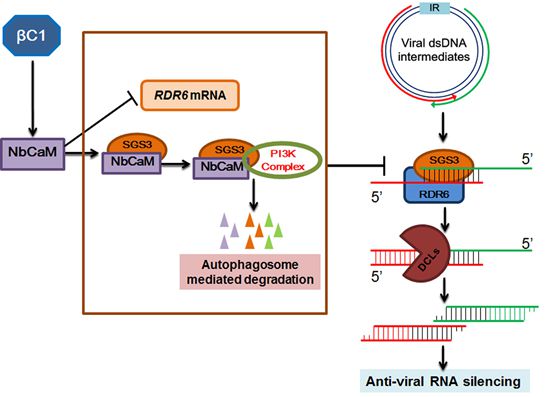分享到
A Calmodulin-like Protein Suppresses RNA Silencing and Promotes Geminivirus Infection by Degrading SGS3 via the Autophagy Pathway in Nicotiana Benthamiana
Post-transcriptional gene silencing (PTGS) is an elaborately regulated process for defense against virus infection in plants. To achieve effective infection, a betasatellite molecule associated with geminivirus induced high levels of an endogenous RNA silencing suppressor, calmodulin-like protein (CaM), to counter host defenses. However, the mechanism underlying CaM-mediated PTGS suppression is poorly understood. Recently, researchers at the State Key Laboratory for Biology of Plant Diseases and Insect Pests, Institute of Plant Protection of CAAS have published a research paper about autophagy pathway-mediated degradation of SGS3 by CaM in Nicotiana benthamiana.

They have previously demonstrated that CaM is an endogenous RNA silencing suppressor that suppresses PTGS and enhances geminivirus infection. The research showed that CaM from Nicotiana benthamiana (NbCaM) interacts with and degrades Suppressor of Gene Silencing 3 (NbSGS3). Deletion analyses showed that domains essential for the interaction between NbSGS3 and NbCaM are also required for the subcellular localization of NbSGS3 and NbCaM suppressor activity. Moreover, NbCaM-mediated NbSGS3 protein degradation can be blocked using the autophagy inhibitors 3-methyladenine and E64d, and by knock-down of key autophagy-related genes within the phosphatidylinositol 3-kinase (PI3K) complex. Silencing of the PI3K complex also inhibited geminivirus infection. These data suggest that NbCaM acts as a suppressor of RNA silencing by degrading NbSGS3 through the autophagy pathway.
More details are available on the bellow links:
http://journals.plos.org/plospathogens/article?id=10.1371/journal.ppat.1006213

Proposed working model summarizing the roles of the endogenous suppressor NbCaM in regulation of PTGS and geminivirus infection
They have previously demonstrated that CaM is an endogenous RNA silencing suppressor that suppresses PTGS and enhances geminivirus infection. The research showed that CaM from Nicotiana benthamiana (NbCaM) interacts with and degrades Suppressor of Gene Silencing 3 (NbSGS3). Deletion analyses showed that domains essential for the interaction between NbSGS3 and NbCaM are also required for the subcellular localization of NbSGS3 and NbCaM suppressor activity. Moreover, NbCaM-mediated NbSGS3 protein degradation can be blocked using the autophagy inhibitors 3-methyladenine and E64d, and by knock-down of key autophagy-related genes within the phosphatidylinositol 3-kinase (PI3K) complex. Silencing of the PI3K complex also inhibited geminivirus infection. These data suggest that NbCaM acts as a suppressor of RNA silencing by degrading NbSGS3 through the autophagy pathway.
More details are available on the bellow links:
http://journals.plos.org/plospathogens/article?id=10.1371/journal.ppat.1006213
By Xiuling Yang
xlyang@ippcaas.cn
xlyang@ippcaas.cn
Latest News
-
 Apr 18, 2024Opening Ceremony of the Training Workshop on Wheat Head Scab Resistance Breeding and Pest Control in Africa Held in CAAS
Apr 18, 2024Opening Ceremony of the Training Workshop on Wheat Head Scab Resistance Breeding and Pest Control in Africa Held in CAAS -
 Apr 03, 2024IPPCAAS Co-organized the Training Workshop on Management and Application of Biopesticides in Nepal
Apr 03, 2024IPPCAAS Co-organized the Training Workshop on Management and Application of Biopesticides in Nepal -
 Mar 28, 2024Delegation from the School of Agriculture and Food Science of University College Dublin, Ireland Visit to IAS, CAAS
Mar 28, 2024Delegation from the School of Agriculture and Food Science of University College Dublin, Ireland Visit to IAS, CAAS -
 Mar 25, 2024Director of World Food Prize Foundation visited GSCAAS
Mar 25, 2024Director of World Food Prize Foundation visited GSCAAS -
 Mar 20, 2024Institute of Crop Sciences (ICS) and Syngenta Group Global Seeds Advance Collaborative Research in the Seed Industry
Mar 20, 2024Institute of Crop Sciences (ICS) and Syngenta Group Global Seeds Advance Collaborative Research in the Seed Industry
